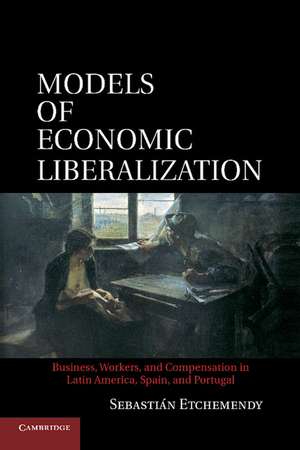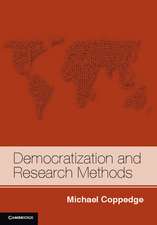Models of Economic Liberalization: Business, Workers, and Compensation in Latin America, Spain, and Portugal
Autor Sebastián Etchemendyen Limba Engleză Paperback – 26 mar 2014
| Toate formatele și edițiile | Preț | Express |
|---|---|---|
| Paperback (1) | 324.24 lei 6-8 săpt. | |
| Cambridge University Press – 26 mar 2014 | 324.24 lei 6-8 săpt. | |
| Hardback (1) | 664.32 lei 6-8 săpt. | |
| Cambridge University Press – 25 sep 2011 | 664.32 lei 6-8 săpt. |
Preț: 324.24 lei
Nou
Puncte Express: 486
Preț estimativ în valută:
62.05€ • 64.54$ • 51.23£
62.05€ • 64.54$ • 51.23£
Carte tipărită la comandă
Livrare economică 12-26 aprilie
Preluare comenzi: 021 569.72.76
Specificații
ISBN-13: 9781107630321
ISBN-10: 1107630320
Pagini: 374
Ilustrații: 28 b/w illus. 47 tables
Dimensiuni: 156 x 234 x 21 mm
Greutate: 0.57 kg
Editura: Cambridge University Press
Colecția Cambridge University Press
Locul publicării:New York, United States
ISBN-10: 1107630320
Pagini: 374
Ilustrații: 28 b/w illus. 47 tables
Dimensiuni: 156 x 234 x 21 mm
Greutate: 0.57 kg
Editura: Cambridge University Press
Colecția Cambridge University Press
Locul publicării:New York, United States
Cuprins
Part I. The Intellectual Terrain: 1. Overview: models of economic liberalization in ISI economies; 2. From state to society: neoliberal reform and a theory of compensation in ISI economies; Part II. The Political Economy of Business Adjustment: 3. Compensating business insiders: the origins of statist and corporatist models in Spain and Argentina; 4. Statist and corporatist models of business adjustment in Spain and Argentina: sectoral case studies; 5. Exceptions that prove the rule: variations within countries in models of business adjustment; Part III. The Political Economy of Labor Adjustment: 6. Compensating labor insiders: the origins of statist and corporatist models in Spain and Argentina; 7. Statist and corporatist models of labor adjustment in Spain and Argentina: sectoral case studies; Part IV. The Market Model: 8. The market path to economic liberalization: Chile in the comparative framework; Part V. Comparative Perspectives in Ibero-America: 9. Models of economic liberalization in Brazil, Portugal, Peru, and Mexico; 10. Conclusions: legacies for the liberalized economies and varieties of capitalism in Ibero-America.
Recenzii
“This is a truly innovative book. It develops a theoretical framework for the analysis of modes of transition from ISI to open economies which is at the same time well grounded in extant literature on the political economy of advanced countries and path-breaking in offering new insights into modes of national industrial adjustment in Iberia and Latin America. The comparative historical analysis is wide-ranging and rich in compellingly marshaled evidence.”
– Evelyne Huber, University of North Carolina at Chapel Hill
“Sebastián Etchemendy’s new book, Models of Economic Liberalization, lays to rest conventional, and overly-general, explanations of the ways in which market based economic reforms are undertaken. The approach Etchemendy takes recognizes that structural economic reform is very much an act of political construction, and that the same general goals can be undertaken in very different ways, based on alternative political constituencies. In an analysis that conjointly treats the politics of state-business and state-labor relations in three distinct (and distinctive) pathways to reform – in Spain, Argentina, and Chile – he provides a masterful treatment that focuses on the ‘compensations,’ the packages of winners and losers created in different trajectories of reform, that were part-and-parcel of liberalization. The result is both a study that gets the politics right, but also sets the interest-group groundwork for what will take place after liberalization is complete.”
– Marcus Kurtz, The Ohio State University
“This book is a landmark in the study of economic liberalization in Latin America and Southern Europe. Drawing on extensive fieldwork, Sebastián Etchemendy documents vast differences in the winners and losers of the variegated forms of economic liberalization that occurred in the countries of these regions. And he uses comparative-historical analysis with great proficiency to work out a compelling explanation of these differences. The result is something that we have been waiting for: a nuanced understanding of the sources and consequences of different patterns of economic liberalization from a historical perspective that is one step removed from the liberalizing processes themselves.”
– James Mahoney, Northwestern University
“Models of Economic Liberalization provides an original theoretical framework for understanding sectoral and cross-national variation in the political compensation of economic actors during economic liberalization. Sebastián Etchemendy shows that the mix of policies by which labor and business groups have been compensated can be explained by differences in political regimes and by variation in the political organization of economic interests during the period of import-substitution industrialization. The innovative research design that contrasts sectoral adjustment across Southern Europe and Latin America allows this study opens up a new dialog with studies of economic reform in advanced industrialized countries, such as the varieties of capitalism perspective.”
– Isabela Mares, Columbia University
“Sebastián Etchemendy's far-reaching and ambitious book puts to rest a number of myths about market oriented reform by unveiling the compensating policies and side payments that made reform politically feasible and at the same time often diminished its longer term benefits. The book weaves together regime dynamics and the variable strength of business and labor into a sophisticated explanation for differing reform trajectories, and draws on deep original research, as well innovative cross-national and cross-regional comparisons, to make it compelling. This is essential reading for anyone interested in the politics of making markets.”
– Ben Ross Schneider, Massachusetts Institute of Technology
“This is an important book. Although the political economy of neoliberal economic reform in Latin America and Southern Europe … is well-tread terrain, Sebastián Etchemendy’s study sheds new light on the subject…The book is theoretically elegant and empirically rich.” -Joseph Wong, University of Toronto, Perspectives on Politics
“Models of Economic Liberalization is an essential addition to the economic development literature. In it, Sebastián Etchemendy provides an original theoretical framework to understand cross-national variation in the political compensation of economic actors during economic liberalization processes…Etchemendy’s research has important implications for the literature of economic reform in both developing and industrialized countries, and powerful ramifications for the modes of transition from ISI to open economies. It is a must read for scholars who aim to build on the existing literature in this field.” -Sebastián Royo, Suffolk University, ILRReview
– Evelyne Huber, University of North Carolina at Chapel Hill
“Sebastián Etchemendy’s new book, Models of Economic Liberalization, lays to rest conventional, and overly-general, explanations of the ways in which market based economic reforms are undertaken. The approach Etchemendy takes recognizes that structural economic reform is very much an act of political construction, and that the same general goals can be undertaken in very different ways, based on alternative political constituencies. In an analysis that conjointly treats the politics of state-business and state-labor relations in three distinct (and distinctive) pathways to reform – in Spain, Argentina, and Chile – he provides a masterful treatment that focuses on the ‘compensations,’ the packages of winners and losers created in different trajectories of reform, that were part-and-parcel of liberalization. The result is both a study that gets the politics right, but also sets the interest-group groundwork for what will take place after liberalization is complete.”
– Marcus Kurtz, The Ohio State University
“This book is a landmark in the study of economic liberalization in Latin America and Southern Europe. Drawing on extensive fieldwork, Sebastián Etchemendy documents vast differences in the winners and losers of the variegated forms of economic liberalization that occurred in the countries of these regions. And he uses comparative-historical analysis with great proficiency to work out a compelling explanation of these differences. The result is something that we have been waiting for: a nuanced understanding of the sources and consequences of different patterns of economic liberalization from a historical perspective that is one step removed from the liberalizing processes themselves.”
– James Mahoney, Northwestern University
“Models of Economic Liberalization provides an original theoretical framework for understanding sectoral and cross-national variation in the political compensation of economic actors during economic liberalization. Sebastián Etchemendy shows that the mix of policies by which labor and business groups have been compensated can be explained by differences in political regimes and by variation in the political organization of economic interests during the period of import-substitution industrialization. The innovative research design that contrasts sectoral adjustment across Southern Europe and Latin America allows this study opens up a new dialog with studies of economic reform in advanced industrialized countries, such as the varieties of capitalism perspective.”
– Isabela Mares, Columbia University
“Sebastián Etchemendy's far-reaching and ambitious book puts to rest a number of myths about market oriented reform by unveiling the compensating policies and side payments that made reform politically feasible and at the same time often diminished its longer term benefits. The book weaves together regime dynamics and the variable strength of business and labor into a sophisticated explanation for differing reform trajectories, and draws on deep original research, as well innovative cross-national and cross-regional comparisons, to make it compelling. This is essential reading for anyone interested in the politics of making markets.”
– Ben Ross Schneider, Massachusetts Institute of Technology
“This is an important book. Although the political economy of neoliberal economic reform in Latin America and Southern Europe … is well-tread terrain, Sebastián Etchemendy’s study sheds new light on the subject…The book is theoretically elegant and empirically rich.” -Joseph Wong, University of Toronto, Perspectives on Politics
“Models of Economic Liberalization is an essential addition to the economic development literature. In it, Sebastián Etchemendy provides an original theoretical framework to understand cross-national variation in the political compensation of economic actors during economic liberalization processes…Etchemendy’s research has important implications for the literature of economic reform in both developing and industrialized countries, and powerful ramifications for the modes of transition from ISI to open economies. It is a must read for scholars who aim to build on the existing literature in this field.” -Sebastián Royo, Suffolk University, ILRReview
Notă biografică
Descriere
This book shows that liberalizing governments across Ibero-America often forge alliances with protected actors such as unions and domestic business.













